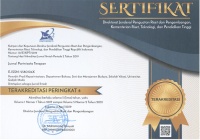Partisipasi Pelaku Usaha Pariwisata dalam Pengelolaan Sampah di Pantai Pulang Sawal, Kabupaten Gunungkidul, Yogyakarta
Jussac Maulana Masjhoer(1*)
(1) Sekolah Tinggi Pariwisata Ambarrukmo Yogyakarta
(*) Corresponding Author
Abstract
Tourism business actors at Pulang Sawal Beach produce waste as many as tourists visit. The waste management issues at the beach area could affect the tourist’s comfort if the problems left unsolved. This study aims to determine the type of waste generated, as well as the participation of tourism business actors in waste management. The type of research used in this study is descriptive qualitative. The population in this study is a tourism business actor at Pulang Sawal Beach. The sampling method used in this study is simple random sampling. Data collection techniques are through observation, interviews, questionnaires, and documentation. The data obtained is then analyzed using qualitative analysis. The type of organic waste produced is in the form of food leftovers, raw materials leftovers, paper, cardboard, cartons, newspapers, etc. While the types of inorganic waste produced are plastic bags, food packaging, plastic and glass bottles, etc. The results showed that tourism business actors participated in the decision-making stage as much as 37%, participated in the implementation of 67.8%, participated in taking benefits as much as 100%, and participated in the evaluation phase as much as 95%. Low participation in decision making due to the lack of knowledge related to waste management, so they choose to listen and accept every decision that is made. They have not implemented good waste management. Tourism business actors agree that a clean business environment benefits both the convenience of work and visitors and assesses that waste management is in accordance with planning.
Keywords
Full Text:
PDFReferences
Arikunto, S., & Jabar, C. S. A. (2009). Evaluasi program pendidikan: pedoman teoritis praktis bagi mahasiswa dan praktisi pendidikan. Jakarta: Bumi Aksara.
Damanhuri, E., & Padmi, T. (2010). Pengelolaan sampah. Diktat Kuliah TL, 3104, 5-10.
Dwiyanto, B. M. (2011). Model peningkatan partisipasi masyarakat dan penguatan sinergi dalam pengelolaan sampah perkotaan. Jurnal Ekonomi Pembangunan: Kajian Masalah Ekonomi dan Pembangunan, 12(2), 239-256.
Daud, F. (2012). Partisipasi masyarakat dalam pengelolaan lingkungan di pemukiman sekitar muara Sungai Tallo Kota Makassar. CHEMICA, 10(1), 9-18.
Davies, T., & Konisky, D. M. (2000). Environmental implications of the foodservice and food retail industries. Washington, DC: Resources for the Future.
Kurniawan, A. (2010). Partisipasi pedagang dalam pengelolaan kebersihan obyek wisata (studi deskriptif kualitatif tentang partisipasi pedagang dalam pengelolaan kebersihan obyek wisata Taman Satwa Taru Jurug Surakarta) (Doctoral dissertation, Universitas Sebelas Maret).
Kurniawan, R. F. (2018, 02-23). Sampah Menumpuk di Kawasan Wisata Jadi PR Pemkab Gunungkidul. Tribunjogja.com. Diakses dari
http://jogja.tribunnews.com/2018/02/23/sampah-menumpuk-di-kawasan-wisata-jadi-pr-pemkab-gunungkidul.
Kusmayadi, E. S. (2000). Metodologi penelitian dalam bidang kepariwisataan. Jakarta: Gramedia Pustaka Utama.
Marliani, N. (2015). Pemanfaatan Limbah Rumah Tangga (Sampah Anorganik) Sebagai Bentuk Implementasi Dari Pendidikan Lingkungan Hidup. Formatif: Jurnal Ilmiah Pendidikan MIPA, 4(2).
Sugiyono, P. Dr. 2010. Metode Penelitian Kuantitatif, Kualitatif, dan R&D. Bandung: CV Alfabeta.
Sutarmi. (2018, 06-20). Kunjungan Wisatawan ke Gunungkidul Mencapai 247.975 orang. Antaranews.com. Diakses dari https://jogja.antaranews.com/berita/357801/kunjungan-wisatawan-ke-gunung-kidul-mencapai-247975-orang
Article Metrics
Refbacks
- There are currently no refbacks.
Copyright (c) 2019 Jussac Maulana Masjhoer

This work is licensed under a Creative Commons Attribution-ShareAlike 4.0 International License.













